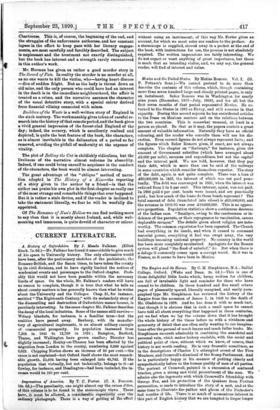Mexico and the United States. By Matins Romero. Vol. I.
(G. P. Putnam's Sons.)—We cannot pretend to do more than describe the contents of this volume, which, though containing more than seven hundred large and closely printed pages, is only an instalment. Sefior Romero was in Washington for nearly nine years (December, 1859—July, 1868), and for all but the first seven months of that period represented Mexico. He re- turned to the States in 1882 as Envoy, and still remains in that capacity. During this second sojourn he has contributed articles to the Press on Mexican matters and on the relations between the two countries. This is somewhat unusual, at least in a person so placed. Be that as it may, the papers contain a great amount of valuable information. Naturally they have an official colouring, and the reader who consults them will use his dis- cretion. Even correct figures do not always represent facts ; and the figures which Seiler Romero gives, if exact, are not always complete. The chapter on "Railways," for instance, gives the amount of Government subsidies (which have averaged about £3,000 per mile), revenue and expenditure, but not the capital and the interest paid. We are told, however, that they pay their debt, which is more than can be said of the railways in some countries which consider themselves superior. The story of the debt, again, is not quite complete. There was a loan of £20,000,000 in 1825, the interest of which was not paid punc- tually. The debt was rearranged in 1851, when the interest was reduced from 5 to 3 per cent. This interest, again, was not paid. In 1888 gold 6 per cent. bonds were issued, and are punctually paid ; but how much of the loans do these bonds represent ? The total amount of debt (translated into silver) is £63,000,000, and the revenue in 1895-96 was over £10,000,000. This is no oppres- sive proportion. Population statistics show a continuous decrease of the Indian race. " Smallpox, owing to the carelessness or in- dolence of the parents, or their repugnance to vaccination, causes deplorable ravages." The details given about religion are note- worthy. The common experience has been repeated. The Church had everything in its hands, and when it ceased to command material power, everything it had was swept away, the very buildings becoming national property. No country in the world has been more aompletely secularised. Apologists for the Roman system will plead "the flood of unbelief," &c. But when there is a deluge it commonly comes upon a corrupt world. So it was in France, so it seems to have been in Mexico.


































 Previous page
Previous page